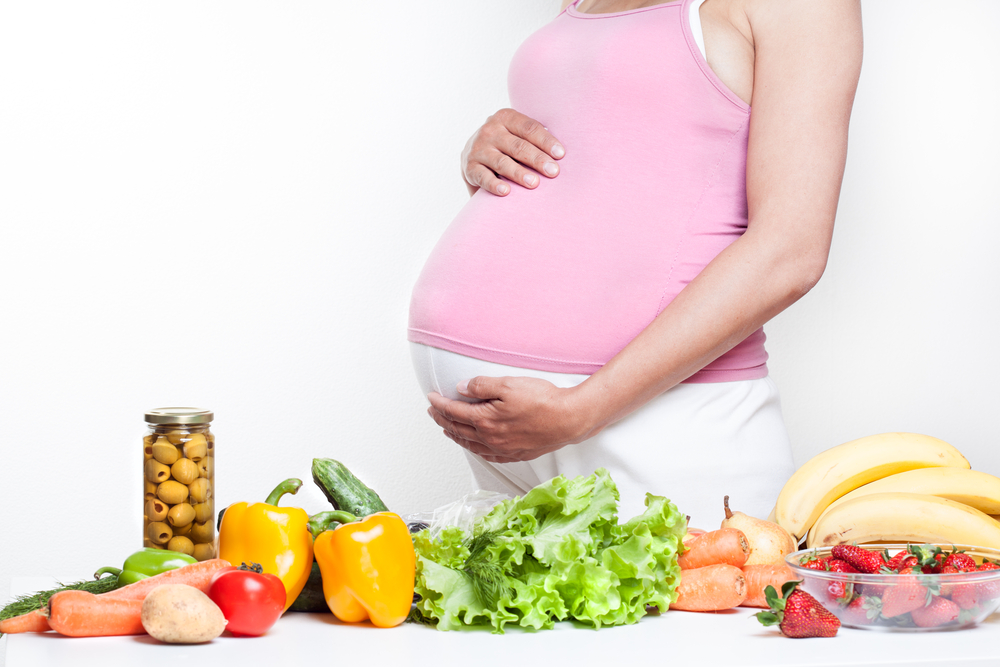_x000D_
You just found out that you’re expecting—congratulations! But before you decide to raise a glass or indulge in that second helping of pumpkin pie, consider what the experts have to say about how to eat sensibly for the next nine months, what to consume in moderation and how to make smart choices at the holiday dinner table.
Debunking the Myths
Expectant mothers may be aware of the old adage of ‘eating for two,’ but according to the experts, piling on the calories without any forethought isn’t prudent. “Although some additional calories are required during pregnancy, it is not significant enough to consume double a normal diet,” says nutritionist Ilyse Schapiro, MS RD CDN and co-author of Should I Scoop Out My Bagel? (Skyhorse, 2016). A general rule of thumb is: no additional calories during the first trimester, an additional 340 calories for the second trimester and another 450 calories for the third trimester.
Throughout your pregnancy, focus on adding essential nutrients to your pregnancy diet, especially folate/folic acid. “It’s important to get adequate amounts of folate/folic acid in order to prevent neural tube defects,” says neuroscientist Nicole Avena, Ph.D. and author of What to Eat When You’re Pregnant (Ten Speed Press). While prenatal vitamins include this nutrient, it can also be found naturally in such foods as green leafy vegetables and in fortified foods like cereal.
Iron is necessary for making hemoglobin and can be found in meat, fish and fortified grains and nuts. “Vegetarians can meet their recommended iron intake by combining iron-containing plant foods with foods high in Vitamin C,” says Shapiro. Be sure to consume at least 27 milligrams of iron per day during your pregnancy.
And of course, calcium is vital for the developmental of your baby’s teeth and bones. Non-milk drinkers can get their daily requirements with other low-fat dairy, black-eyed peas and calcium-fortified orange juice. “Just remember to shake the carton, so that the calcium is distributed throughout the beverage,” suggests Avena.
Celebrate Those Superfoods
With so much buzz circulating around the importance of superfoods, expectant mothers can also reap the benefits of these healthy additions. For starters, registered nurse and author of Common Sense Pregnancy Jeanne Faulkner recommends focusing on a “whole superfood category: vegetables and fruits, consumed in as close to organic form as possible. Think baked potato, not French fries,” she says.
For those looking to zero in on certain food choices, Shapiro recommends eggs (containing over 12 vitamins and minerals, as well as choline for brain development), salmon (omega-3 fats support brain health and may serve as a mood booster) and walnuts, which she plugs as “the richest plan source of the essential omega-3 fatty acids.”
Also on the superfoods list are fiber-rich sweet potatoes and squash. “The fiber will help with constipation, which can be a problem during pregnancy due to shifts in hormones,” says Aveda. To satisfy those sweet tooth cravings, she recommends dark chocolate, which provides iron, magnesium, phosphorus, potassium and mono-saturated fatty acids. “Aim for 70-85 percent cacao for the best benefits,” she adds.
Caveat Foodies
Just as important as what to keep an eye out for, is what to avoid eating while pregnant. A well-rounded diet is always advisable, says Faulkner. In Common Sense Pregnancy, she writes: “If you’re really going to commit to doing the absolute best thing for your baby, don’t eat junk food or any of the other processed ‘food-like substances’ with the endless ingredient lists your grandmother wouldn’t recognize.”
High on the no-no list are soft cheeses and deli meats, both of which may contain listeria (a bacteria that may result in a miscarriage). Fish that contains high levels of mercury, such as swordfish and shark, should be avoided, while canned tuna should be limited.
Those moms-to-be who still need their caffeine fix should reduce their daily consumption, especially during the first trimester. According to Shapiro, drinking up to 200 milligrams per day during pregnancy is sufficient.
And if you’ll be apple- or pumpkin-picking this fall, don’t necessarily partake of those farm stand refreshments. “It may be tempting to drink apple cider at a local farm or pumpkin patch, but it may contain dangerous bacteria that can harm your baby if it isn’t pasteurized,” says Avena. “Be sure to ask before indulging.”
Happy, Healthy Holidays
As you gather with family and friends during the busy holiday season, steer clear of any rum toddies or other alcohol beverages, but do stay hydrated. “Adequate hydration is not only good for energy levels, but helpful in making people feel full and satisfied,” says Shapiro. She also recommends maintaining a balanced diet during holiday get-togethers by eating from the four major food groups. “Pregnant women should not deprive themselves but sticking to one serving of their favorite holiday dessert would be smart,” she adds.
Aveda also stresses the importance of portion control, especially during social gatherings where “food pushers” may urge you to eat more than you should. “Appetizers are typically calorically dense, so choose only one or two…and fill the rest of your plate with veggies,” she offers. For buffets and sit-down meals, stay away from heavy side dishes like mashed potatoes and green bean casseroles, and use an appetizer plate for the main meal.
Just be sure to save room for some dark chocolate.
_x000D_
_x000D_




